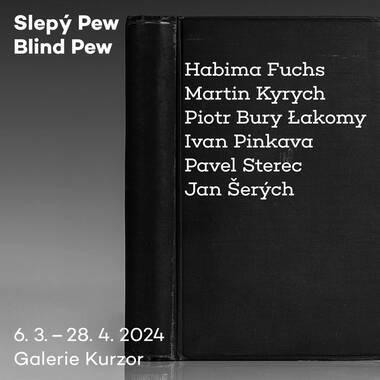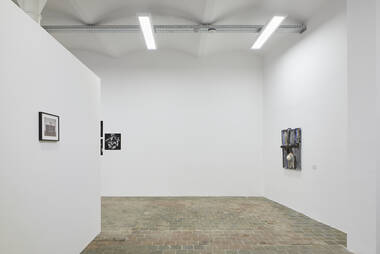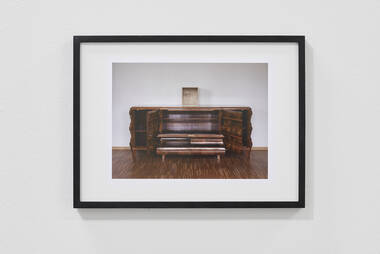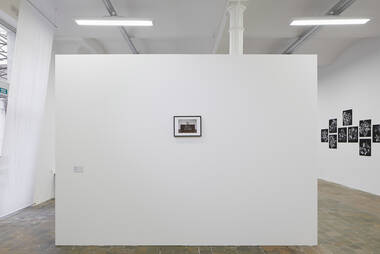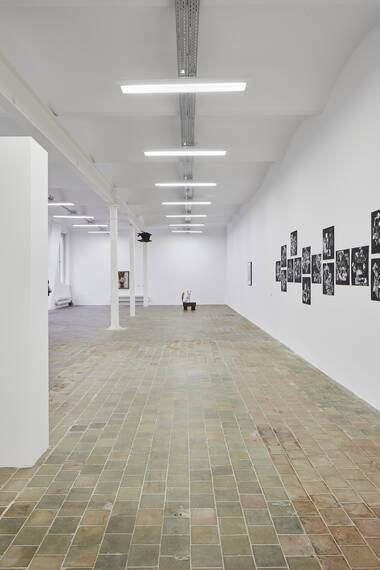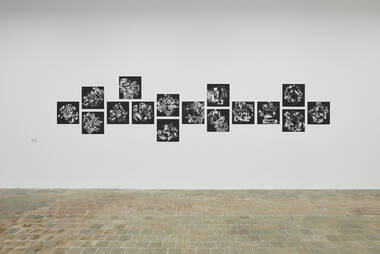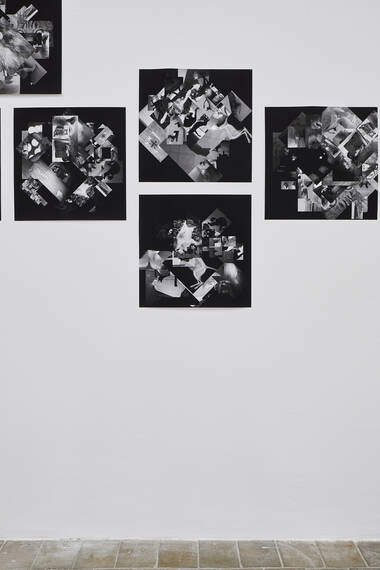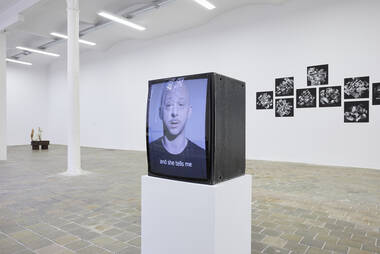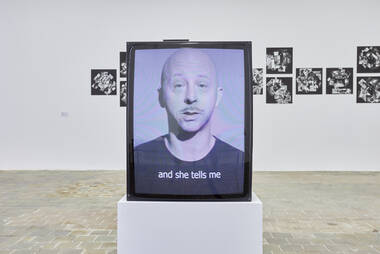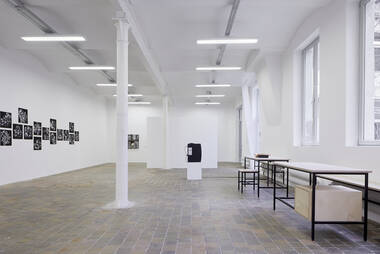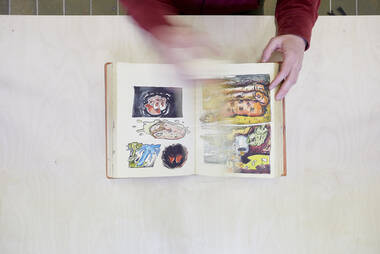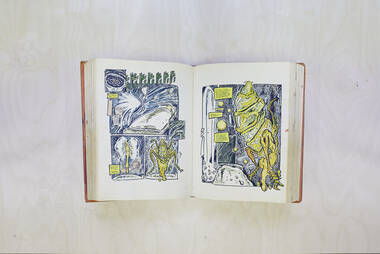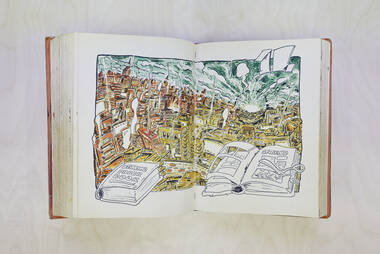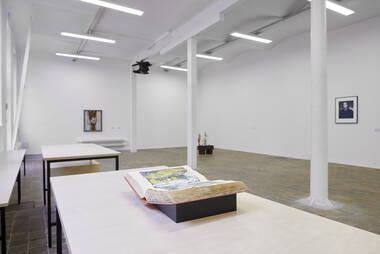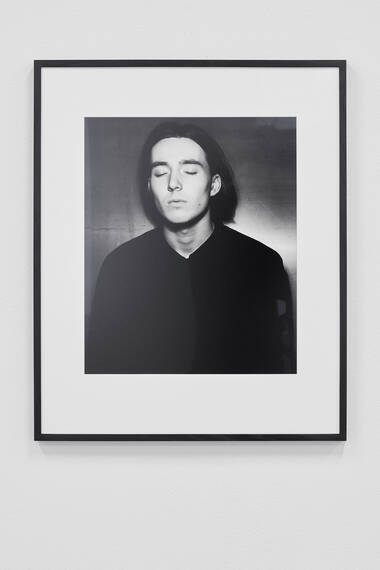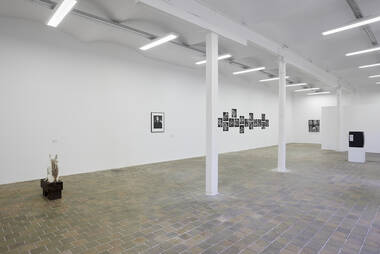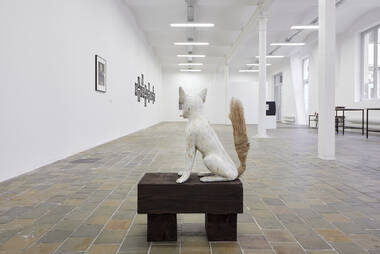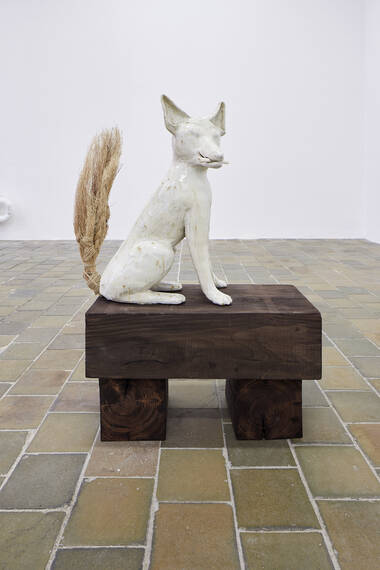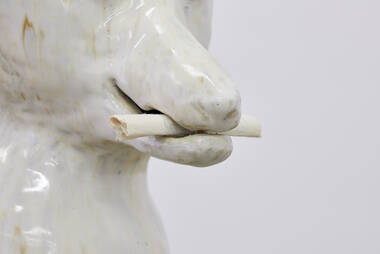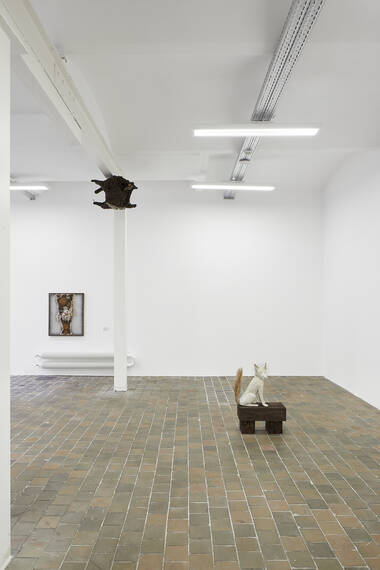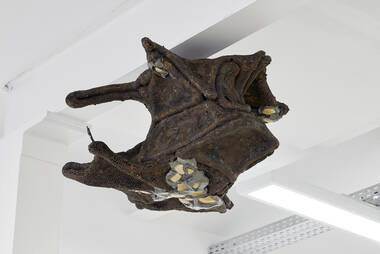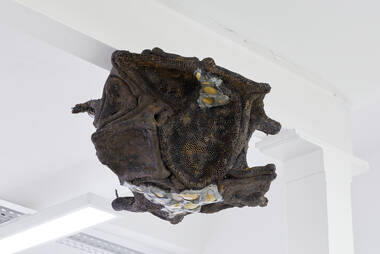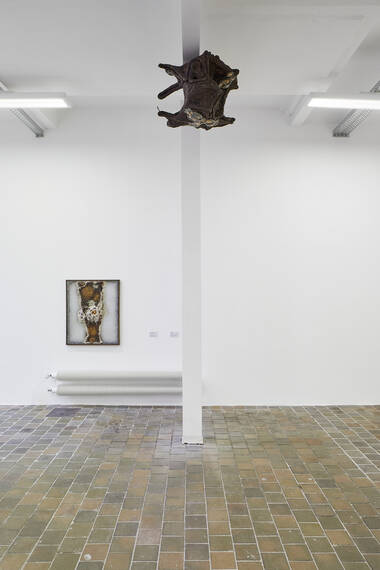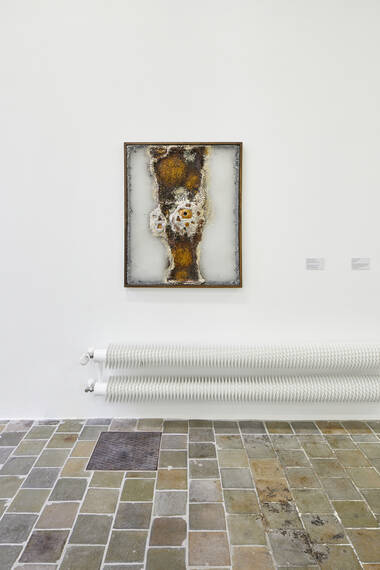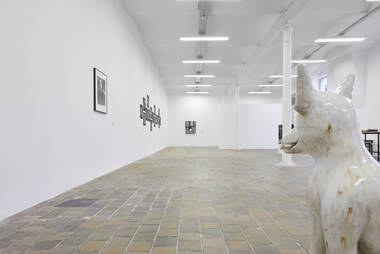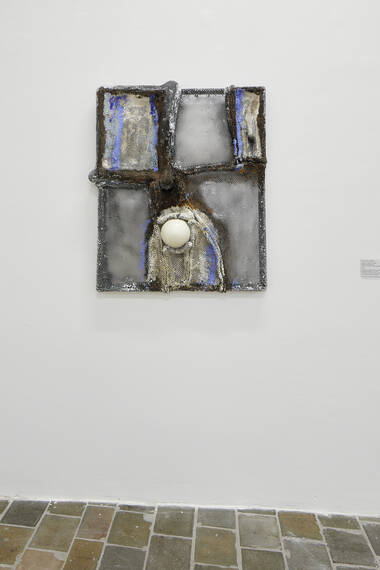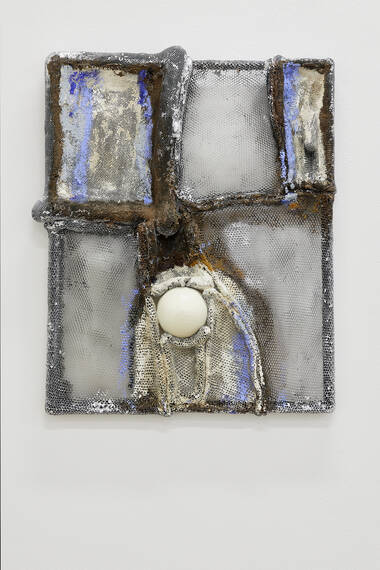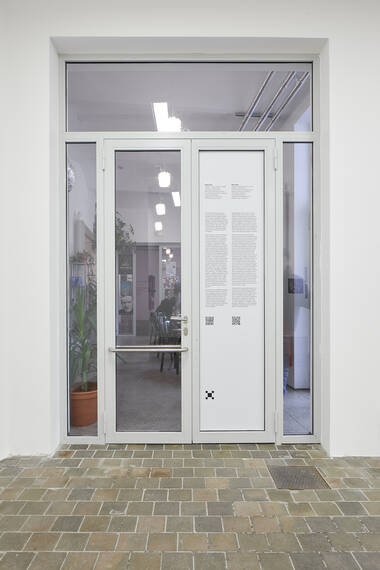Blind Pew
Habima Fuchs, Martin Kyrych, Piotr Bury Łakomy,
Ivan Pinkava, Pavel Sterec, Jan Šerých
6. 3. – 28. 4. 2024
opening: 5. 3. 2024 from 6 PM
discussion with artists: 9. 4. 2024 from 6 PM
guided tour: 28. 4. 2024 from 4 PM
curator: Marek Meduna
in collaboration with Zuzana Blochová
graphic design: Jan Šerých
The exhibition does not have a clearly defined theme, but is based on several motifs, the interweaving of which forms contours or trajectories winding their way through the entire experience. Individual artistic aesthetics and pedigrees are not meant to merge into one another, nor are they intended to create sharp conceptual oppositions. The works are continuous and offer possible pathways through different levels of viewing, from one nest of laboriously constructed connections to another.
Some animals and new technologies cover their tracks: others transform their domestication into its antithesis, in which the master becomes servant and the pet or tool the master. Others carry unsolicited and illegible messages regarding the ludicrous stampede of humans and the wildly spinning Earth that generates more and more representations of itself, just as mirrors and sexual intercourse multiply the Earth’s population. They create variations of the same, sticky networks of disconnected stories, instant narratives that circulate in a public yet fragmented space. Behind the fullness of all wishes granted, the lingering darkness of a deep well opens up in Western society. Moisture rises from its poisonous throat and just as the first fish emerged from the sea, so, too, do many attempt to build umbrella structures and suitcase shells in the shape of an endless building that is inhabited, and hopefully not obsessed, by the image of a detective, tracing with his fingers the shimmering distance marked by a blue line at a height of one hundred and thirty centimetres. His and their story continues for as long as memory serves, before the sclerotic neurons recoil with a gasp. Trains and trams will be covered in dust.
Each exhibition always demonstrates in part the loss of communication between artists and artefacts and therefore between the works and their viewers. A side effect of attempts at persuasion is absence: absence in the sense of emptiness, emptiness for something, in the sense of Central European words spoken into the void, emptiness as a shelter in timelessness, emptiness as an all-consuming nothingness and emptiness as the possibility of a Treasure Island.
Habima Fuchs
A line of cars was parked along the road. Her legs ached. She’d been walking on hard asphalt all day long. Voluntary solitude, a light rucksack with her belongings on her back and streams of individuals converging from all sides kept her going. Despite not having a map with her, she didn’t lose her way. The landscape was clear and without trees. She took the occasional rest and drew towns behind highways overpasses and wreaths of supermarkets. After all, exploring the unknown is not the prerogative of Sinbad, Darwin or Eric the Red. There is something of the explorer in us all. To begin with, everyone discovers what is sweet, salty, soft, smooth, rough, discovers the colours of the forest, the distant perspectives behind little more than twenty letters. Then come roads, faces, cities and islands, in order that she finally learn of her own ignorance. She carried with her books that she had not read, and as she continued to wander, she went back yet further into the past. To forgotten details, to apples polished gold, to twisted trees between villages. To foxes bidding good night. To the elements that protect domestic animals. To the covering of tracks before the creeping abstraction. In the evening, she set up her little tent at a campsite, stood in line at the refreshment counter and ordered a cup of tea. Before she had received it, people at the next table asked if she could take a photo of them. They were smiling. On the table in front of them was a handmade map of one place.
Martin Kyrych
They stripped naked and rang through the poppy field. The commotion startled a flock of starlings and fentanyl users. The latter collapsed on the ground, laughing. I can’t catch my breath. Me neither. The urge prickled unpleasantly beneath the diaphragm. Wise little poppies with world class product swayed gently. They flicked through the pages. Blood and sewage seeped out of the toilet. No toilet paper of course. The door hanger had been ripped off. He was scrolling through the latest messages from X. Western leftist liberals marching for rights. Others with a small “o” speaking of mission and purpose. Theory may have offered remarkable suggestions, though in practice it has given rise to monstrosities and museum artefacts. In commentaries, some added that evil was a shell of the old worlds. The people offered forgiveness to the populists. The sins of inauspicious charisma were forgotten in the flow of the murky, lazily flowing river. Angrily he tore the book from its binding, unable to believe so many dark corners of humour, too many facets of irony. The detective’s raincoat was not lacking in magical powers. A blind man was depicted on the half-title. Maybe Homer, maybe Borges, maybe Pew. But the illustrator’s hand had twisted him unpleasantly into the shape of a comic book character. The title of the book was illegible.
Piotr Bury Łakomy
He sat down by the river for one last cigarette. He took a puff and behind him was a forest of towers in the international style of parametric architecture. The former brownfields were populated with people relaxing. Winter had finally turned to spring, the sun had gained strength and it was pleasantly warm on his skin. He crossed the road followed by the rattling wheels of his suitcase to the plane. He followed carefully the thin blue line that led him to the correct check-in hall. He left the busy area behind and entered the building. He felt the humidity of a dreamy universalism and the soft cologne of Music for Airports™ permeate through him. A swarm of bees nestled above one of the gates. The endless house of creatures hummed darkly against a backdrop of ambient hustle, bustle and hurriedly checked in passengers. Security barriers ushered airline customers into a different world. Those who didn’t pass had to spread their arms and undergo a second search. During the night, an hour before his alarm clock rage, a woman woke him and confided that she had been sent into space. The time capsule contained an anachronistic toxicity, the larvae of queen bees, existential growth, silkworm aesthetics and several bulky books by Tomas Mann, to which she had added Cosmos – how appropriate – by her favourite author Gombrowicz. Then she cried out that they would never see each other again. He tried to console her. Then the alarm went off and it was time to leave. Ugly layers of old worlds peeled off the hanging nest, struggling to blend in with the local environment. Workers swarmed among the aluminium honeycombs. Hundreds of thousands of membranous wings, millions of faceted eyes.
Ivan Pinkava
He returned home after the weekend. He ventilated, dusted and vacuumed. There was not much work to be done in the garden in winter. He turned on his computer. Frozen rivers of crimson blood oozed from the dresser. He picked up a ball of old wax, the most stable material in the universe according to René Descartes and Petr Vaňous. He closed his eyes. It was getting dark. He drove carefully up the hill, the road was slippery. He unlocked the gate, crossed the rain-soaked lawn. He took off his shoes. The air in the living room slowly grew colder. The cat, nestled in its chair, raised its head lazily, arched its threadbare spine and turned onto its other side. It didn’t bat an eyelid. He refreshed its water and poured some kibble into a bowl. He closed his eyes. Turn around. A bit more. He dipped his hands in the graphite and tried to wipe the uniqueness from the model’s face. They stood with their backs to each other. When he shaved his head, it was possible to see the crown that was normally covered by his hair. He wanted to paste it, though his element was air. The wind trapped in time. The rhizomes of tradition and order formed behind his eyelids. Precision was a thorn in his side. With serious astonishment he understood. In this night of his mortal eyes, into which he now descended, love and danger also awaited. In the last chamber, amidst sprays of daisies.
Pavel Sterec
Every time the frost hit, his father found him with his tongue stuck to the icy handle. He was like a dog that has forgotten that the stick in his mouth was preventing him from entering. Since childhood he had enjoyed tinkering with puzzles and thought experiments. Waiting for school to open in the morning, his classmates would naturally gather around him. Girls hadn’t yet begun to notice him. The feeling was mutual. He had a small stone levitate in front of their eyes. Another time he told them of the many connected apartments in the middle of Holešovice. About the seams and shafts of graphite mines. About the closed eyes of wizards, behind which a congress is held of random yet countless experts on one arbitrarily chosen topic. The illusion allowed them to forget the inadequacy of their own childhood. During high school he burrowed into culture like a mole into the secret services. He became an agent of libido and shadow. His thought experiments could be interpreted as effective cost-saving measures. The consequences of his cuts led him to new discoveries. One human being made a resolution to draw the world and over the years he found his own face in the tangle of lines, cuts and changing synapses.
Jan Šerých
He emerged from the subway. He walked along the pavement dividing the park into two equal parts. He rang the bell at the house whose number corresponded to the square root of the area of one section in metres. A gruff female voice sounded from behind the door. Hullo, we don’t want any leaflets. But it’s you, come on up. There was a buzz and the lock clicked. He opened the door into the corridor and walked quickly up to the first floor, where a slender woman in her forties stood in the doorway. After making sure he was who he was supposed to be, she let him in. Golden flakes of dust floated in the maisonette, the thick-pile carpet muffled his footsteps. She warned him that any excess sensation would cause him pain. He sat down as instructed and turned on the recorder on his iPhone. Then he listened to his gravelly voice, watching the vague silhouette against the drawn blinds. He could sense the cats moving gracefully in the room. The folds of darkness multiplied their number, as did his dry, stone-crackling voice. He said, no one could expect that at my age I abound in the first of the elements, namely fire. I feel like the earth, a very tired earth. He added. Every moment is like a loaded pistol. At any moment the cock might crow three times. And every moment can be a walk through the grass of paradise. He wanted to drink, but dared not. He still had something on the tip of his tongue when they parted. But he forgot what. I am Matilda, she called to him from behind the closing door. He walked back the other way, around the square and over the bridge across the tracks. To check, he played the footage he had taken as he walked. Boom.
The program of the Cursor Gallery is possible through kind support of Ministry of Culture of the Czech Republic, Prague City Council, State Fund of Culture of the Czech Republic, City District Prague 7,
GESTOR – The Union for the Protection of Authorship
Media partners: ArtMap, jlbjlt.net and artalk.cz
